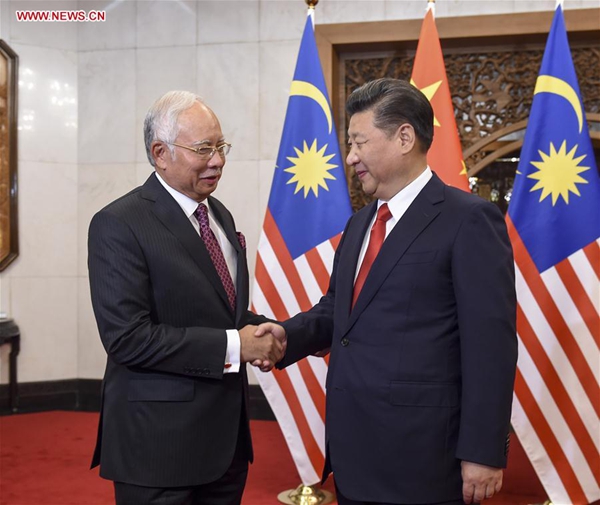The ever-evolving China-ASEAN relationship
- By Tim Collard
 0 Comment(s)
0 Comment(s) Print
Print E-mail China.org.cn, November 11, 2016
E-mail China.org.cn, November 11, 2016
|
|
|
Chinese President Xi Jinping (R) meets with Malaysian Prime Minister Najib Razak in Beijing, capital of China, Nov. 3, 2016. (Xinhua/Li Xueren) |
Following the ground-breaking visit to China of new Filipino President Rodrigo Duterte, there appears to have been an additional reorientation towards China, signaled by the visit of Malaysian Prime Minister Najib Razak in the first few days of November. Razak had earlier signalled an alignment of interests with the U.S. after taking office in 2009.
The background to the Sino-Malaysian rapprochement is not primarily political, but economic: the growing perception of China as the source of solutions to economic difficulties means that China absolutely cannot be ignored when a country considers repositioning its wider ties. China has already helped out when a Malaysian state investment fund, in which Prime Minister Razak was heavily involved, got into trouble, while the USA only raised embarrassing questions. China's biggest nuclear energy producer, China General Nuclear Power Corporation, purchased the Malaysian fund's power assets for $2.3bn in 2015.
During the Prime Minister's visit, the estimated value of bilateral deals signed was US$34 billion. Much of this will be deployed in infrastructure projects, in accordance with China's established policy of building relations on - literally - solid foundations in the framework of support which the AIIB was set up to create. (China is already the largest investor in Malaysia's infrastructure.)
One of the principal focuses of interest during Razak's visit was the situation in the South China Sea, where Malaysia and China have had differences in the past. It became clear during the visit that Malaysia will follow the Philippines in refusing to allow these differences to interfere with a strong and comprehensive relationship. Precise details have understandably not been released, but Malaysia is due to buy four Chinese naval vessels, and joint naval exercises are likely to be held shortly between the two countries in order to emphasize that cooperation has driven out confrontation.
China has always sought to maximize positive engagement with the ASEAN countries. Forty to fifty years ago, relations between China and Southeast Asian countries were tense to such an extent that long-existing Chinese communities within those countries were regarded with suspicion and often oppressed. A major Chinese diplomatic initiative in the 1980s and early 1990s reversed this situation, established a strong foundation for a network of relationships within the region and disarmed outdated suspicions of China.
Of course the Chinese leadership is not unaware of some of the internal strains under which some ASEAN countries operate. Like Indonesia - and, to a lesser extent, Singapore - Malaysia has a large and cohesive Islamic community which has to be kept happy. On his return to Malaysia Prime Minister Razak has had to defend himself against accusations that his rapprochement with China threatens unfairly to favor the Malaysian Chinese community, which plays a disproportional role in the domestic economy. It can be hoped that the concentration of Chinese finance on the infrastructural sector will convince the Malaysian population that this relationship benefits everyone, irrespective of their ethnic origin.
In terms of global security, some American analysts focus on the attraction exerted by China on countries that the USA has become accustomed to regard as allies, and seen a potential threat to U.S. global interests in this. The reality is that this is not a zero-sum game: a friend of China does not automatically become an enemy of the U.S., and vice versa. In the case of ASEAN countries, it is hardly surprising that they would wish to optimize their cooperation with the main regional power, and there is no reason why this should not be a win-win situation. In a strongly globalized economy it is perfectly legitimate to trade with, and derive economic support from, any country capable of doing so.
So, let us hope that Prime Minister Razak can convince his compatriots that improving relations with China can only help Malaysian citizens, whatever their ethnicity.
Tim Collard is a columnist with China.org.cn. For more information please visit:
http://www.ccgp-fushun.com/opinion/timcollard.htm
Opinion articles reflect the views of their authors, not necessarily those of China.org.cn.






